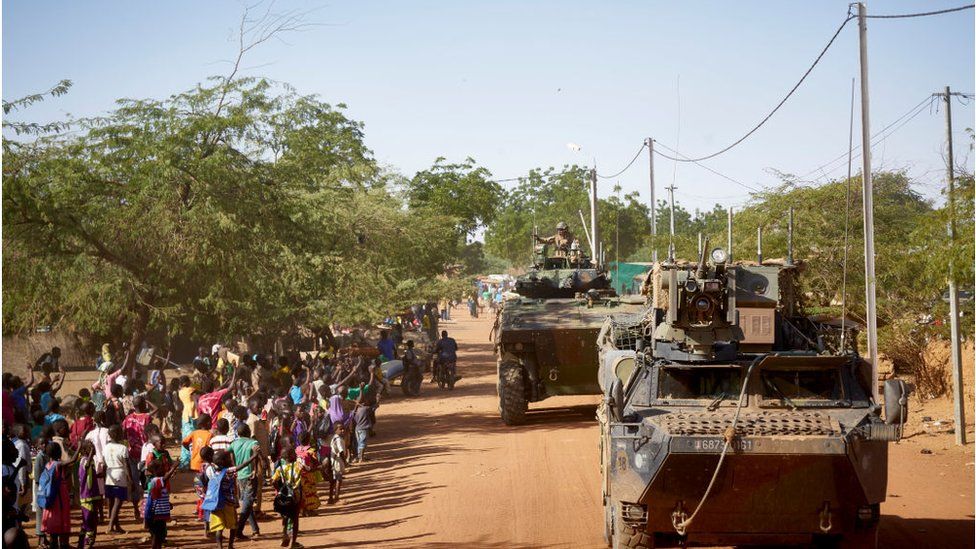Burkina Faso Ejects French Troops
AFRICA, 30 Jan 2023
Vijay Prashad | Independent Media Institute – TRANSCEND Media Service
25 Jan 2023 – On 18 Jan 2023, the government of Burkina Faso made a decision to ask the French military forces to depart from the country within a month. This decision was made by the government of Captain Ibrahim Traoré, who staged the second coup of 2022 in Burkina Faso in September to remove Lieutenant Colonel Paul-Henri Sandaogo Damiba, who had seized power in a coup d’état in January. Traoré, now the interim president of Burkina Faso, said that Damiba, who is in exile in Togo, had not fulfilled the objectives of the Patriotic Movement for Safeguarding and Restoration, the name of their military group. Traoré’s government accused Damiba of not being able to stem the insurgency in the country’s north and of colluding with the French (alleging that Damiba had taken refuge in the French military base at Kamboinsin to launch a strike against the coup within a coup).
France entered the Sahel region in 2013 to prevent the southern movement of jihadist elements strengthened by the war in Libya, prosecuted by the North Atlantic Treaty Organization (NATO). In the past few years, anti-French sentiment has deepened in North Africa and the Sahel. It was this sentiment that provoked the coups in Mali (August 2020 and May 2021), Guinea (September 2021), and then in Burkina Faso (January 2022 and September 2022). In February 2022, Mali’s government ejected the French military, accusing French forces of committing atrocities against civilians and colluding with jihadi insurgents. Burkina Faso has now joined Mali.
The ejection of France does not mean that there will be no NATO countries in the region. Both the United States and Britain have a large footprint from Morocco to Niger, with the United States trying to draw African countries into its contest against China and Russia. Regular trips by U.S. military leaders—such as U.S. Marine Corps General Michael Langley (commander of U.S. Africa Command) to Gabon in mid-January – and by U.S. civilian leaders—like Treasury Secretary Janet Yellen to Senegal, South Africa, and Zambia—are part of a full-court press to ensure that African states forge closer ties with the United States and its allies over China. The designation of Russia’s Wagner Group—which is said to be operating in the Sahel—as a “transnational criminal organization ” by the United States and the U.S.-Africa Leaders Summit, held in mid-December, are both attempts to draw African states into a new cold war.
Almost half of the Burkinabé population lives below the poverty line, and “more than 630,000 people are on the brink of starvation,” in the country, according to the UN. The country is, however, not poor with its gold export reaching $7.19 billion in 2020. These gains do not go to the Burkinabé people but go to the large mining companies. Ejection of the French military will not be the answer to these deep-seated problems faced by Burkina Faso.
_______________________________________________
 Vijay Prashad is an Indian historian, editor and journalist. He is a writing fellow and chief correspondent at Globetrotter. He is the director of Tricontinental: Institute for Social Research and a senior non-resident fellow at Chongyang Institute for Financial Studies, Renmin University of China. He has written more than 20 books, including The Darker Nations and The Poorer Nations. His latest book is Washington Bullets, with an introduction by Evo Morales Ayma.
Vijay Prashad is an Indian historian, editor and journalist. He is a writing fellow and chief correspondent at Globetrotter. He is the director of Tricontinental: Institute for Social Research and a senior non-resident fellow at Chongyang Institute for Financial Studies, Renmin University of China. He has written more than 20 books, including The Darker Nations and The Poorer Nations. His latest book is Washington Bullets, with an introduction by Evo Morales Ayma.
This article was produced by Globetrotter.
Tags: Africa, Africom, Burkina Faso, European Union, France, Military Intervention, NATO, Neocolonialism, USA
This article originally appeared on Transcend Media Service (TMS) on 30 Jan 2023.
Anticopyright: Editorials and articles originated on TMS may be freely reprinted, disseminated, translated and used as background material, provided an acknowledgement and link to the source, TMS: Burkina Faso Ejects French Troops, is included. Thank you.
If you enjoyed this article, please donate to TMS to join the growing list of TMS Supporters.

This work is licensed under a CC BY-NC 4.0 License.
